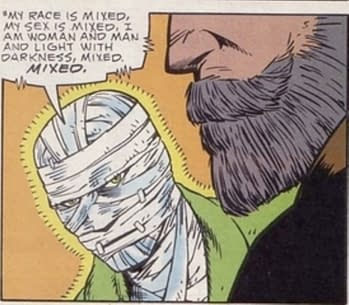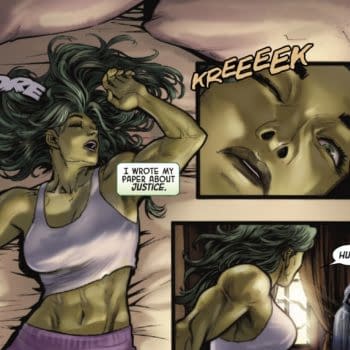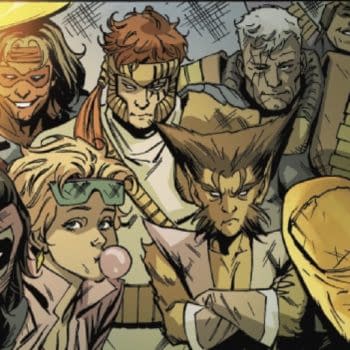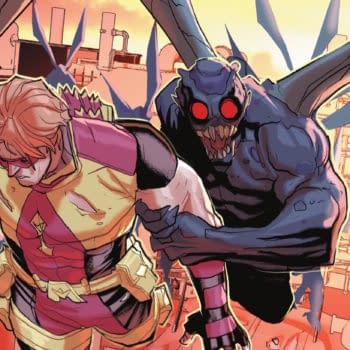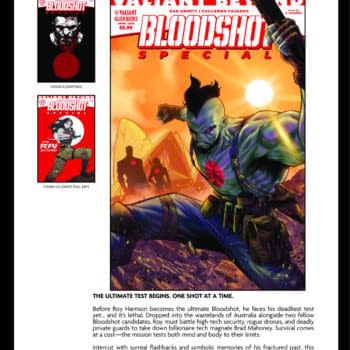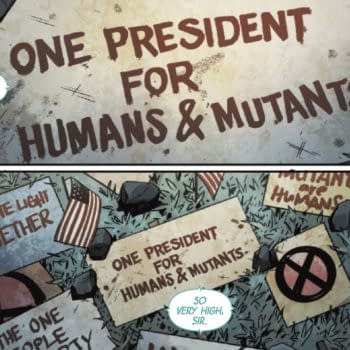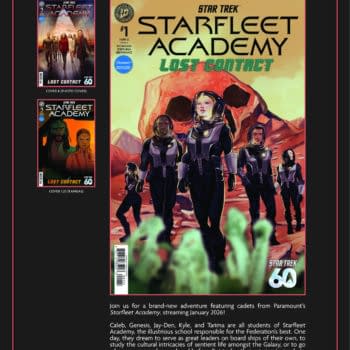Posted in: Comics, DC Comics | Tagged: comicsgate
Vertigo – a Comic Book Line Founded on 'SJW Values'?
Of late, an argument is being made loud and clear, mostly by the #Comicsgate activist group on social media, that the Vertigo brand failed due to, frankly 'SJW bullsh-t'. The phrase 'get woke, go broke' has been repeated ad infinitum. And this has been emphasised by pointing out recent Vertigo books such as Border Town, Hex Wives and Goddess Mode while ignoring any other titles the publisher may have been putting out.
It just seems to utterly ignore the history of DC Vertigo and the comics that preceded the setting up of that brand.
Alan Moore, Rick Veitch, Steve Bissette and John Totleben's Swamp Thing was the epitome of 'SJW' comics at the time. Diverse sexuality, liberal politics, anti-war and ripping apart racists were the themes of the day.
The first chance Grant Morrison and Richard Case had on Doom Patrol, they took the 60s-established character Negative Man and rewrote them as a nonbinary character, reinventing DC villains, The Brain and Mallah as a gay couple. After Morrison left, trans writer Rachel Pollack took over the comic, and introduced trans characters to the team such as Coagula. While Grant Morrison and Chas Truog made Animal Man a vegan. And as for The Invisibles…
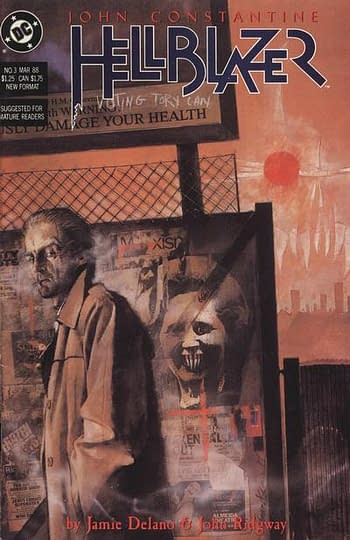
Sandman gave us the character of Wanda, a trans character fighting the world over who she was, against the Moon which doesn't recognise her identity. Her death, as she is rather literally 'deadnamed' and buried by her conservative family under her birth name, has her best friend write her name on her gravestone in bright pink lipstick – and we see her with Death, finally recognised for who she is. Neil Gaiman says he would have written that story differently now, but for its time there was no more 'woke' comic than Sandman: A Game Of You.
While Transmetropolitan was a walking talking Hunter S Thompson who didn't so much punch Nazis in the face, as shoot them with bowel disruptors. While even Jesse Custer of Preacher used the word of God to get racist policemen to sever their own penises and stuff them up their arses. I mean, Ennis had plenty of other issues that he would end up openly dealing with in the Wildstorm comic Kev, but you can see where he heart was, even then.
Engima from Peter Milligan and Duncan Fegredo was the superhero comic book that had a character come out as gay towards the end of the book – and was the first lead gay character in a superhero comic published so widely. And yes, there were letters.
While Y The Last Man by Brian K Vaughan and Pia Guerra would be condemned by some for misandry and SJWness of the worse kind for a story that killed off all but one of the men in the world.
The biggest problem Vertigo faced was recruitment – thanks to internal changes imposed from Warner Bros, the offered deal was inferior to publishers such as Image, Dark Horse, Boom, IDW, Dynamite, Avatar, Black Mask, Vault, Ahoy, Aftershock, AWA, Marvel and more – and DC lost its big guns to its rivals. They only got Neil Gaiman back for Sandman Overture and Sandman Presents after a decade of negotiation, unwilling to match the terms Gaiman got elsewhere.
That combined with losing Karen Berger and Shelly Bond, who set up their own mini-Vertigos elsewhere the second their contract allowed them to, gave new Vertigo comic books a 'taint' – and this has been true for several years, and nothing to do with the quality of the comics – a number of which are as good as Vertigo has ever been. I would cite Red Thorn by David Baille and Meghan Hetrick as a standout. But it was outsold by equivalent books from other publishers. It may have flourished at the likes of Image, Vault, or Black Mask, but Vertigo was giving retailers a reason not to increase a book's orders but decrease them. Which is the very opposite of what an imprint should do.
Brian Bendis was able to negotiate some very favourable terms from DC for his line of creator-owned books, matching his Marvel deal. It has been noted that if DC Comics made those terms available to others, all manner of folk may flock back. I'm wondering if they'll match the deal for Scott Snyder and his upcoming line of creator-owned titles.
But if certain people decided that DC Vertigo was suddenly hiring 'SJW' creators and that's what doomed them – heaven help they look at the expanding line of creators and books for DC's line of young readers titles, hiring novelists, young adult writers and kids writers from prose, as well as cartoonists popular on DeviantArt, Tumblr and Instagram including many who have never written or drawn a comic book before. That line isn't shrinking, it is growing, and found a rapturous response at the recent BookCon and American Libraries Association. Socially justice warriors, the lot of them.
Vertigo had big problems as a brand, and had destroyed much of its proud legacy through internal politicking. It may well have continued even so, if it wasn't for President Pamala Lifford's disdain for imprints on a conceptual, now replacing them all at DC with age guideline labels instead – and fewer of those too. But to argue that Vertigo died due to 'SJW bullsh-t' over the last year, when arguably that's the very kind of thing it was founded and prospered upon, seems to ignore what DC Comics have published for the last twenty years – and still are publishing.


